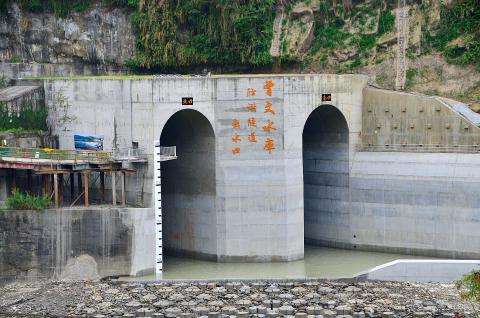Premier William Lai (賴清德) yesterday promised to ensure stable water supply for all sectors of the economy and encouraged businesses to invest in Taiwan as he presided over a ceremony to mark the completion of a major dredging system for the Zengwen Reservoir (曾文水庫).
The holding capacity of the reservoir, which spans Chiayi County and Tainan, has been dramatically reduced in recent years by about 100 million cubic meters, or about one-sixth of its capacity, due to a build-up of sludge and sediment.
Typhoon Morakot in 2009 alone contributed 90 million cubic meters of mud, which prompted the government to design a dredging system to remove the sludge from the nation’s largest reservoir.

Photo: Wu Chun-feng, Taipei Times
Construction of the NT$4.1 billion (US$141 million at the current exchange rate) system began in March 2013.
A 1.26km underground tunnel system was built across the hill on the left bank of the dam to the downstream Zengwen River (曾文溪) to transport bottom sediment from of the reservoir to downstream areas.
The nation’s largest water resource construction project in years, it is considered an engineering feat, as it was carried out without a cofferdam enclosure.

Photo: Wu Chun-feng, Taipei Times
The use of an “elephant trunk pipe” used to excavate bottom sediment is an unprecedented engineering design, Lai said during the ceremony.
“The priority of the government is to develop the economy and improve Taiwan. To enable a stable supply of water, the government has put forward methods, including creating additional water supply, water conservation, and transporting water across regions” to aid areas prone to water scarcity, the premier said in his speech.
Dredging has also been carried out at the Nanhua Reservoir (南化水庫), Wushantou Reservoir (烏山頭水庫) and Baihe Reservoir (白河水庫) in Tainan to create more storage capacity, and improvements will be made to recycling facilities to make sure that every drop of water can be used two to three times, he said.
About 82 percent of the rain that falls in Taiwan goes to waste as runoff, while of the water that is stored, 72 percent is used by the agricultural sector, 9 percent by the industrial sector and 18 percent by households.
The government is to launch a water conservation program to reduce agricultural water waste by as much as 93.8 million cubic meters per year, or the total storage capacity of Nanhua Reservoir, Lai said.

INVESTIGATION: The case is the latest instance of a DPP figure being implicated in an espionage network accused of allegedly leaking information to Chinese intelligence Democratic Progressive Party (DPP) member Ho Jen-chieh (何仁傑) was detained and held incommunicado yesterday on suspicion of spying for China during his tenure as assistant to then-minister of foreign affairs Joseph Wu (吳釗燮). The Taipei District Prosecutors’ Office said Ho was implicated during its investigation into alleged spying activities by former Presidential Office consultant Wu Shang-yu (吳尚雨). Prosecutors said there is reason to believe Ho breached the National Security Act (國家安全法) by leaking classified Ministry of Foreign Affairs information to Chinese intelligence. Following interrogation, prosecutors petitioned the Taipei District Court to detain Ho, citing concerns over potential collusion or tampering of evidence. The

Seventy percent of middle and elementary schools now conduct English classes entirely in English, the Ministry of Education said, as it encourages schools nationwide to adopt this practice Minister of Education (MOE) Cheng Ying-yao (鄭英耀) is scheduled to present a report on the government’s bilingual education policy to the Legislative Yuan’s Education and Culture Committee today. The report would outline strategies aimed at expanding access to education, reducing regional disparities and improving talent cultivation. Implementation of bilingual education policies has varied across local governments, occasionally drawing public criticism. For example, some schools have required teachers of non-English subjects to pass English proficiency

‘FORM OF PROTEST’: The German Institute Taipei said it was ‘shocked’ to see Nazi symbolism used in connection with political aims as it condemned the incident Sung Chien-liang (宋建樑), who led efforts to recall Democratic Progressive Party (DPP) Legislator Lee Kun-cheng (李坤城), was released on bail of NT$80,000 yesterday amid an outcry over a Nazi armband he wore to questioning the night before. Sung arrived at the New Taipei City District Prosecutors’ Office for questioning in a recall petition forgery case on Tuesday night wearing a red armband bearing a swastika, carrying a copy of Adolf Hitler’s Mein Kampf and giving a Nazi salute. Sung left the building at 1:15am without the armband and apparently covering the book with a coat. This is a serious international scandal and Chinese

TRADE: The premier pledged safeguards on ‘Made in Taiwan’ labeling, anti-dumping measures and stricter export controls to strengthen its position in trade talks Products labeled “made in Taiwan” must be genuinely made in Taiwan, Premier Cho Jung-tai (卓榮泰) said yesterday, vowing to enforce strict safeguards against “origin laundering” and initiate anti-dumping investigations to prevent China dumping its products in Taiwan. Cho made the remarks in a discussion session with representatives from industries in Kaohsiung. In response to the US government’s recent announcement of “reciprocal” tariffs on its trading partners, President William Lai (賴清德) and Cho last week began a series of consultations with industry leaders nationwide to gather feedback and address concerns. Taiwanese and US officials held a videoconference on Friday evening to discuss the